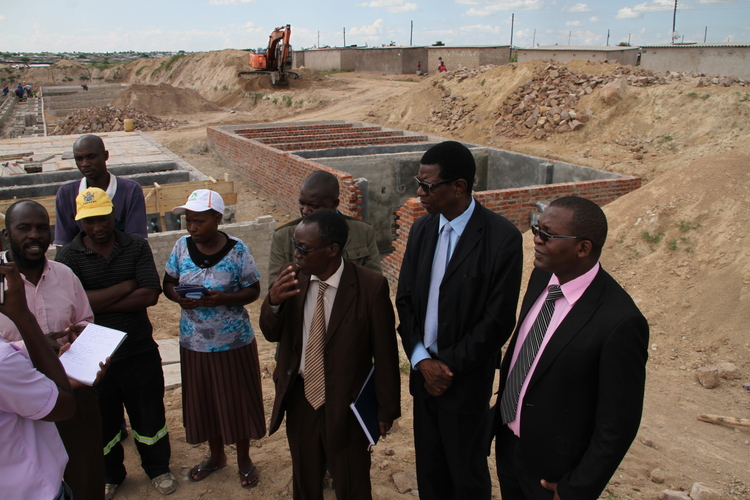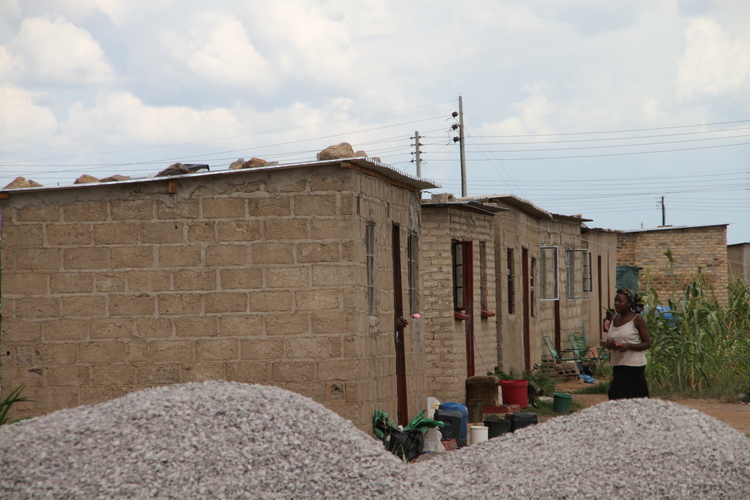
The Sunday Mail

Tafadzwa Kadani
HOUSING Co-operatives were not banned but were prohibited from occupying state land, a senior Government official has said.
SMEs and Co-operatives Development Deputy Minister Noveti Muponora said contrary to reports stating that Government had banned the co-operatives, it was the allocation of State land to co-operatives which was stopped.

SMEs and Co-operatives Development Ministry officials during a tour of Hopley B suburb
“There was a misinterpretation of my ministry’s position regarding housing co-operatives. They were never banned but it was the allocation of state land to co-operatives which was stopped with immediate effect,” Deputy Minister Muponora explained.

Some of the temporary houses that were built for Hopley B residents
He disagreed with the demolition of houses built illegally on State land describing the exercise as unfair.
Houses that were built at Arlington Estates near Harare International Airport were demolished as they were constructed on land earmarked for port expansion.
Following the demolitions, the Local Government, Public Works and National Housing Ministry banned allocation of State land to housing co-operatives.
Deputy Minister Muponora said, “It is quite unfortunate that it had to come to this. If we were part of the decision-making, we would have been a bit lenient. After all, it was not the co-operatives but the land barons that failed the people.
“I agree that there have been problems with some co-operatives who took advantage of desperate home seekers. We cannot, however, throw away the water along with the child simply because the child contaminated the water.”
He said the co-operatives were introduced when Government and local authorities were unable to deliver affordable housing to the people.
The deputy minister said the pioneers of housing co-operatives were not educated on how to run them and were in the dark when it came financial accountability, electing board members and holding general meetings as stated in the Co-operative Societies Act (Chapter 24:05).
“Let us interrogate how the problems that are now associated with housing co-operatives came about. The emergence of land barons are not even associated with co-operatives,” he added.
According to the deputy minister, the two ministries involved will soon come together and map the way forward.
“We are currently working on a position paper which will be the starting point of our dialogue with the Ministry of Local Government, Public Works and National Housing. The paper will highlight a number of issues and proffer solutions to the issues related to housing co-operatives,” he said.
Over 7 000 housing co-operatives have been registered with SMEs and Co-operatives Development Ministry.
Mr Mike Duru, president of the Zimbabwe National Association of Housing Co-operatives, said the ban on allocation of State land to co-operatives was prejudicial.
“The Local Government Ministry should not have enforced a blanket ban on State land allocation. In my view, there are co-operatives that are performing well and deserve to be allocated State land,” Mr Duru said.
Mr Duru said the Local Government Ministry should have instituted an investigation that would then flush out land barons.
“We implore the ministry to come up with solutions that will deal with land barons once and for all,” added Mr Duru.
Allocation of stands will now be done by local authorities with the Urban Development Corporation overseeing all housing developments on designated State land.
Efforts to get a comment from Local Government Minister Saviour Kasukuwere were fruitless by the time of going to print.
Mr Michael Chideme, the Harare City Council’s acting communications manager, said: “We are capable of servicing land. At the moment, we are in the process of identifying State land and waiting for Government to allocate us land. We currently have a project which is in full swing in St Martins,” Mr Chideme said.
Housing co-operatives emerged in the late 1980s to augment Government’s efforts to provide housing, especially to low income earners.
Dzivarasekwa, Nehanda and Hopley B housing co-operatives are among the better performing organisations.
Silver lining in a dark cloud
Extra Reporter
The dominant narrative is that housing co-operatives are fleecing homeseekers. There is a lot of truth to that claim. But that is not the entire story.
Consider Hopley B Housing Union, a consortium of 18 housing co-operatives in Harare South.
With a cumulative membership of 843, people paying subscriptions are drawn from such low income earners as vendors and cross-border traders among others.
Formed in 2010, the union has done what some housing co-operatives have failed to do in over a decade.
The union of 18 co-operatives has so far built temporary houses for all its members.
Mr Manatsa Chinhengo, the union’s chairperson, says once the City of Harare issues them a certificate of compliance, then permanent structures will be erected.
“We have done almost everything that needs to be done. Once we receive our certificate of compliance, we will then construct permanent structures” Mr Chinhengo said.
The union has built a tarred road linking the settlement to other areas.
Mr Stephen Hlatywayo, director of Co-operatives Development in the SMEs and Co-operatives Development Ministry, was impressed by what he saw during a recent tour of the settlement.
“The members pooled their resources and constructed this road. I am impressed by such a high level of organisation,” Mr Hlatywayo said.
Apart from the road, the union has also drilled four boreholes, erected five tower lights, connected electricity and is in the process of building a septic tank sewer reticulation system.
“We have so far spent plus or minus US$4 million in the construction of houses and the necessary infrastructure. If we were operating as individuals, we could have not reached this far,” said Mr Chinhengo said.
In line with Zim-Asset’s goals, the union has created employment for its members through the construction work.
The union will in the near future commission a biogas plant.
Mr Martin Gumi, a member of the union, said: “I am a self-employed carpenter and were it not for this union, I was not going to get this stand and built this house. I thank the Government for supporting us the low income earners.”
According to Mr Chinhengo, each household has so far contributed US$4 500. The Harare City Council required a minimum deposit of US$50 000 to service the land.
“We are here to lessen the burden on the Government and to augment its efforts to provide affordable housing to citizens of Harare,” said Mr Chinhengo.



